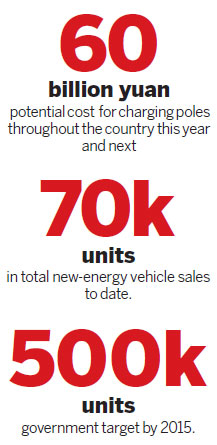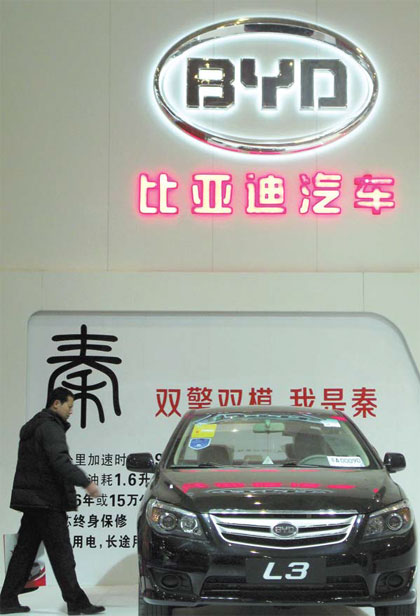Ma: New-energy cars need additional jolt
Updated: 2014-04-20 08:05
By Zhuan Ti(China Daily)
|
|||||||
|
BYD has taken the lead in China in new-energy vehicles, but faces a big hurdle with the lack of charging infrastructure throughout the country. Zhen Huai / For China Daily |
Vice-Premier talks with industry's leaders
The Chinese government is mulling new incentives to power the development of new-energy vehicles, Vice-Premier Ma Kai told industry insiders late last month in Shenzhen.
He told a meeting with auto executives on Mar 26 that new solutions will include purchase tax deductions or even exemptions for clean vehicles like pure electrics and hybrids.
He said the government is also considering dropping a policy that requires gradual reduction of subsidies on such vehicles.
In addition, he said the government plans to levy pollution fees on conventional vehicles, with the revenue used for development of new-energy vehicles and related facilities, according to a report by the 21st Century Business Herald.
The Chinese government initiated a series of preferential policies for new-energy cars in 2009 and 2010, selecting 25 cities as pilots for implementation.
But only 70,000 new-energy vehicles have been sold to date, far from the government's goal of 500,000 units by 2015.
Some companies even complained that they have "dim hopes" for the future. They have felt the pinch from sluggish development of charging facilities, weak support policies and local trade protectionism.
"The government's support policies announced last September are not strong enough to boost the industry, but the new moves (proposed by Ma Kai) will be crucial for the sector's growth in the next few years," an insider who attended the meeting told the 21st Century Business Herald.
The source said that Ma also proposed special "green-colored" license plates for new-energy cars that would be exempt from lottery or auction processes implemented by several local governments.
The authorities are studying policies to attract private capital into the sector for vehicle production or infrastructure construction, Ma said, according to the 21st Century Business Herald.
Industry insiders agreed that exemption from the purchase tax would be the biggest bonus for the sector.
"If the government can initiate an exemption, it will bring fundamental and far-reaching influences to the market," said an executive from Shenzhen-based BYD, the major electric vehicle producer in China.
He said the purchase tax on various BYD electric vehicles - including the e6, Qin and the K9 bus - is about 10 percent of the total price on average.
Infrastructure
Delegates to the meeting said a lower market threshold for private investment would help ease the infrastructure shortfall.
They said insufficient charging facilities are shackling the industry's development.

State Grid Corp planned to build 4,000 charging stations from 2011 to 2015 and 10,000 stations by 2020.
But the company has to date only set up 400 charging facilities. The company said last year that it is a big burden to be the sole investor and operator of the charging business.
It began five rounds of public bids to build charging poles starting at the beginning of this year.
State Grid said it welcomes private investors to join in the operations if allowed by the State policy.
The nation's major cities also have plans to step up construction of charging facilities.
The government of Beijing said it plans to add 100 fast-charging stations in the first half of this year and build another 1,000 charging poles for public use by the end of 2014.
Tianjin's plan requires the completion of 6,700 charging poles by 2015 and Shanghai want to have at least 6,000 in the same period.
Statistics indicate the total investment for charging poles throughout the country could total 60 billion yuan ($9.8 billion) this year and next.
During the Shenzhen meeting, Vice-Premier Ma urged more coordination among ministries.
To date, the Ministry of Science and Technology, the Ministry of Industry and Information Technology, the National Development and Reform Commission and the Ministry of Finance have been involved in planning and support for new-energy vehicles.
Ma proposed inclusion of more organizations including the Ministry of Housing and Urban-Rural Development, the National Energy Administration, the Ministry of Land and Resources and the Ministry of Transport.
More confidence
Despite existing difficulties in infrastructure, some automakers are showing increasing confidence in their growing investments.
FAW and SAIC have joined with Volkswagen to develop new-energy cars.
Volkswagen China announced that it will introduce at least 15 types of new-energy vehicles by 2018 and begin local production of many of them in 2016.
The campaign will be an important part of Volkswagen's 18.2 billion euro ($25.1 billion) investment plan from 2014 to 2018 in China.
Shenyang-based Brilliance Auto inked a 1.8-billion-euro ($2.5 billion) agreement with BMW late last month focused on the new-energy sector.
A partnership agreement between Dongfeng and PSA lists R&D on technology and new vehicles as a core part of cooperation.
Domestic auto component manufacturer Wanxiang acquired US-based new-energy carmaker Fisker Automotive for $180 million in February in a bid to enter the market.
Nanjing Jinlong Group is investing 2 billion yuan in a new-energy vehicle project in Wuhan, Hubei province, with construction well underway as scheduled.
zhuanti@chinadaily.com.cn
(China Daily 04/20/2014 page43)
